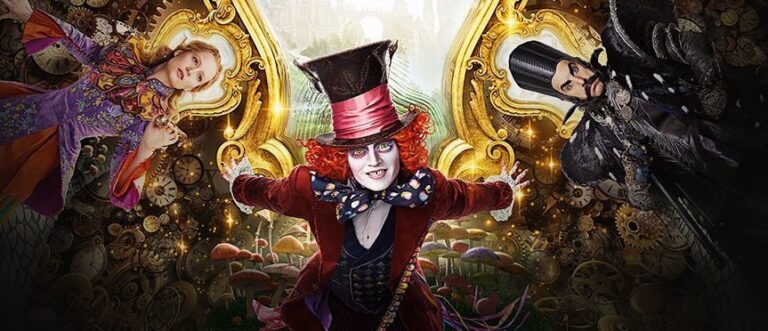Disney’s Alice Through the Looking Glass is exactly what you might it expect it to be – an unnecessary sequel trying to cash in on the confusing global success of the generally disliked original. Besides some occasionally impressive visuals and few fun ideas, this one isn’t really worth the trip back to Wonderland.
Alice Through the Looking Glass continues the story from Alice in Wonderland of an older Alice (Mia Wasikowska) making her way in the real world as an idealistic, strong woman in an oppressive man’s world. She’s found herself captain of her late father’s ship Wonder and has been leading a crew on adventures across the globe.
After a fairly exciting opening sequence where Alice shows off her impressive leadership skills and ingenuity as a captain on the high seas, she returns to London to find her ex-fiancée Hamish (Leo Bill) is on the verge of taking ownership of her mother’s house, and even Alice’s own ship. When things look their worst, Alice finds herself drawn back to Wonderland by the most peculiar of entrances – a looking glass.
Upon her return, Alice finds that the Mad Hatter (Johnny Depp) has spiraled into a deep depression that is literally starting to kill him after coming across an item he believes is proof his long thought dead family is actually still alive.
If this all sounds nonsensical and extremely hard to follow, it absolutely is – and it only gets worse from here. Alice decides she has to convince Time himself (Sacha Baron Cohen) to let her use his Chronosphere (time travel thingy macguffin) to travel back in time and save the Hatter’s family. Easier said than done, especially when Time is a bit of a prick.
Obviously the film has little to do with the actual book by Lewis Carroll, since many of the events and characters covered in that book were introduced in the previous film. As bizarre and as WAY off-book as Alice Through the Looking Glass is, Baron Cohen as the completely new character Time is competently entertaining and one of the few bright spots alongside the returning Helena Bonham Carter -crushing it once again as the scenery-chewing Red Queen.
Johnny Depp, on the other hand, is almost unwatchable as the Mad Hatter this time out – I didn’t care for him in Alice in Wonderland and he’s infinitely worse in this one. Obviously, they wanted to capitalize on the actor’s global popularity by giving the Hatter a more central role this time – also while giving Depp more emotions to play with inside the character – but the result is an annoying, mopey Hatter for most of the film that seems selfish, displays none of this “great” friendship the film claims he has with Alice, and rarely has any fun like a Mad Hatter should.
The visuals occasionally provide a few fun action sequences, such as the ship escape in the opening, but the screen is normally so busy and dripping with CG that your eyes can’t even take in and appreciate what is supposed to be gorgeous designs and scenery. Only in a few moments – like seeing the clock cogworks that make up Time’s body – does the film ever actually use the effects to its advantage.
The film also plays around with “timey wimey” time travel logic, but to very uninspired and predictable results. Alice Through the Looking Glass uses time travel as an excuse for the film to do Red Queen and Mad Hatter origin stories – the former easily being the most interesting of the two. Unfortunately, Anne Hathaway as the White Queen is completely lost in the shuffle and doesn’t have any of the wonderfully weird moments she had in the first film.
Aside from a few fleeting moments of inventive visuals and action, director James Bobin taking over for Tim Burton unfortunately ends up with a “Meet the new boss, same as the old boss” scenario with Alice Through the Looking Glass making nearly all the same mistakes that made Alice in Wonderland a poorly-received mess.
All the things that made the original generally unlikable - the cornball humor, overuse of CG, lack of story direction - are mostly back in this unnecessary sequel that is only slighty better that the first, but has too few moments of actual wonder to justify it's existence.
-
SCORE4




